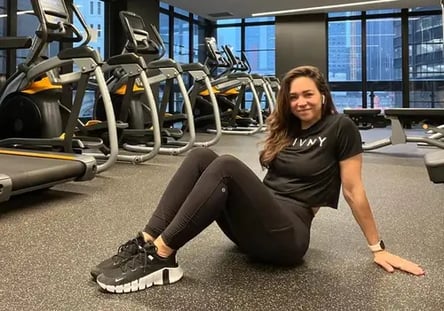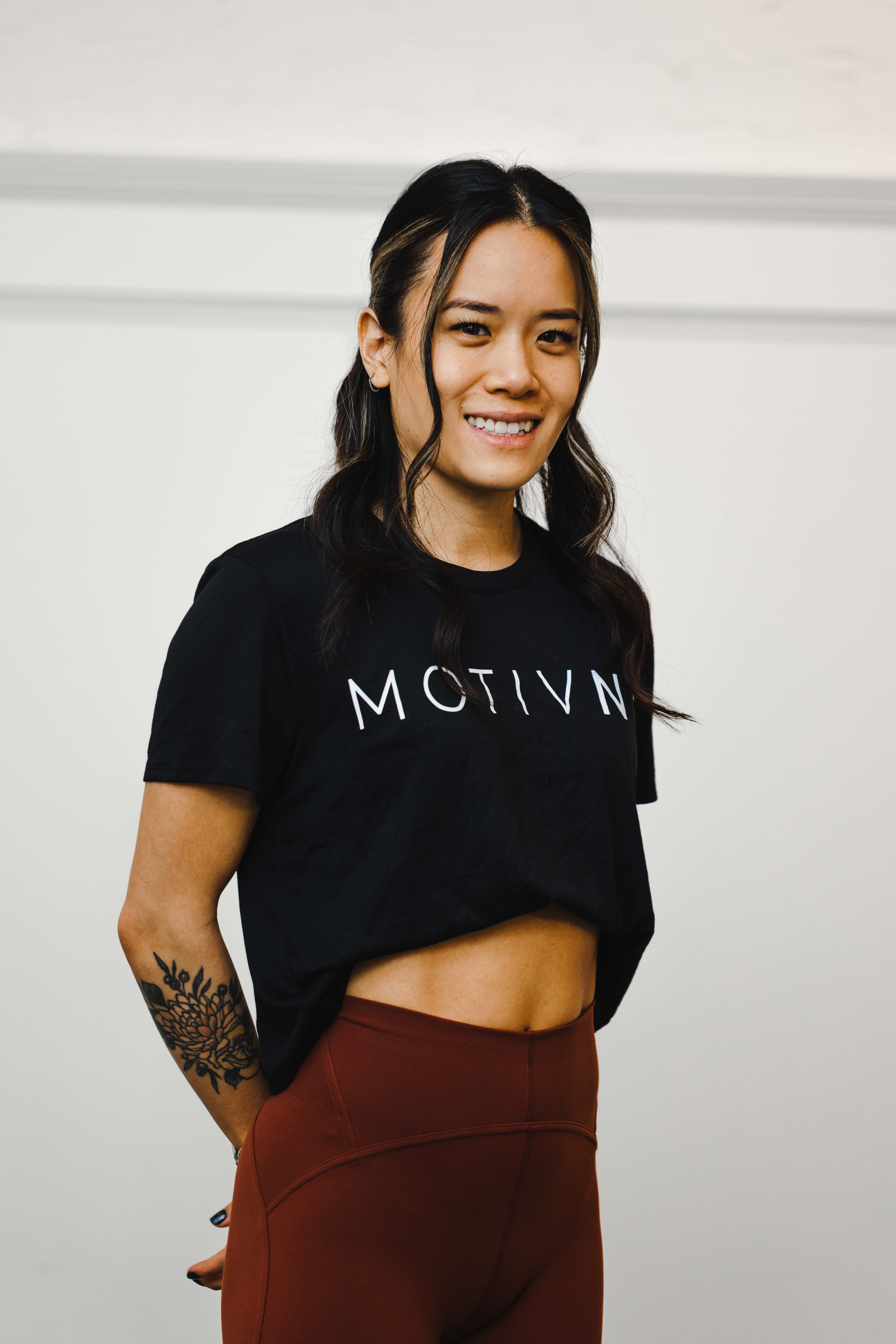New Year New Me? Emily Abbate on Goal-Setting
January 12, 2023
With each new year comes a wave of hope, dreams, and renewed motivation. The turning of the page can produce a reawakening of determination within oneself, and that seems like it should be a powerful feeling to channel. Yet, the ubiquitous message throughout social media tells us that New Year's resolutions are pointless and should be avoided. I spoke to Hurdle Podcast's wellness coach Emily Abbate about goal-setting and how to do it well.

Jess: Alright, Em. There’s so much talk out there about how New Year’s resolutions don’t work. What would be your argument for setting goals at the start of a new year?
Emily: I really appreciate the opportunity that a new year presents to have a fresh start. WIth that said, every single day can be the day that you choose to start anew. Every single minute can be the minute that you choose to start over. It doesn't need to be January 1st, but there is a lot of momentum around adopting and creating new habits at the beginning of the year. So I'm of the mindset: why not lean into that? If you're already being inundated with imagery and testimonials of individuals going after their potential at the beginning of the year, why not use that to your advantage?
Jess: That's so true; why not allow yourself to be inspired by others? But then when thinking about your own goals and what to commit to, where do you start? How important is it to look backwards before you look forwards?
Emily: So the most important thing when it comes to setting a new goal is figuring out your 'why.' So if I'm going to sit here and tell you that I want to lose weight in the new year, I need to know and be able to identify why that goal is important specifically to me.
Jess: Seeing other people's resolutions and thinking that they look fancy or attractive isn't enough to motivate you to make lasting changes in your own life.
Emily: Exactly, because if it has no actual relevance or symbolism for you, that's going to be problematic. So knowing your 'why' when it comes to setting a goal is going to be the first thing that you need to figure out so that you can stay on task when things get hard. And things are going to get hard.
Jess: Right. James Clear, the author of Atomic Habits, says "The real challenge is not determining if you want the result, but if you are willing to accept the sacrifices required to achieve your goal."
Emily: It's very rare that you set a goal for yourself and there are, no pun intended, hurdles along the way. So knowing your 'why' is really going to help you stay on task in those moments where things feel challenging.
Doing an audit of what it is that you're going after and making sure that the goal isn't, for lack of a better term, floofy, is huge. Get really intentional and specific about what it is that you want to achieve. The more dialed in you can get on that front, the better you'll be in the long term.
Jess: So when it comes to being injured or going into the new year with something that you're dealing with, how do you set intentions around an injury?
Emily: The most important thing when it comes to navigating injury is that you meet yourself where you're at. It's so critical to start with a foundation of grace and kindness for yourself. More than likely, this is something that is beyond your control, and recognizing that is the first and most important step in moving forward.
I would say my biggest piece of advice aside from having grace is making realistic goals based on where you're at. So I know that I ended last year with the goal of running a marathon in April. I am now dealing with an injury. If I was to go after that same goal, I would be doing myself in the long term a disservice. So take a step back. Know that we are literally in this for life, and set your goals in a way that reflects an understanding of the long term.
Jess: How can working with a Physical Therapist help you plan out your goals?
Emily: Being injured can be a really emotional thing. We don't work hard to see things not go as we plan, but it takes a very strong person to be able to pick yourself up and pivot from the plan. So many of us suffer through so many different setbacks as a year goes on. And although they may look different for each and every person, we can all relate to the difficulty in that feeling.
Working with a coach or a PT when it comes to injury can really help keep you calm in a time of uncertainty and stress. It's mentally grounding to get a qualified expert to weigh in on what the next best steps are for you. Even coaches need coaches, right? So regardless of who you are or what your credentials are, getting a second opinion about your body is never going to be something that you regret, especially and most importantly with someone who is qualified in their field.
I choose to come to MOTIVNY because I know that you guys are the best at what you do. You're highly educated, and I have so much trust in working with Luke, and so having that trust means I can unload some of my own stress around this injury.
Jess: What habits or routines do you have to help you achieve your goals?
Emily: New for me this year is trying out a habit tracking journal. I've never been super dialed in on tracking my habits before, but there are always little things that feel kind of trivial that I let slip by the wayside.
But beyond that, again, it just comes back to taking care of yourself. I know that I can't pour from an empty cup. And as someone who considers herself a connector and also a very big giver, I need to make sure that that starts with giving and connecting with myself, and making time to do things that I know fill me up. It really goes back to that concept of grace, right?
Jess: Totally. Having grace with yourself, with your emotional and physical state day to day, and prioritizing your own well-being in order to enhance the well-being of others. So once you have your goals set, how do you measure success?
Emily: I would encourage you to think of your goals as quarterly and audit quarterly. Like, let's say if your goal for 2023 is to increase your back squat from 120 lbs to 200 lbs. Definitely doable. But what is that going to look like? It's going to be a slow grind of incremental progress. So keep track of your progress in a way that feels good for you. Make a checklist. Tell a friend to have them keep you accountable. Decide on a prize that you'll give yourself when you reach your goal. Because, again, this is for you. It's not for anybody else.
Jess: I think that is actually the crux of the problem that is being talked about on social media. Quarterly or monthly objectives, or any goals that are more specifically time-bound are going to be easier to achieve because they are more easily measured.
Emily: Luke and I were just talking about this today during our PT session. Good habits don't give you a payoff immediately very often. Say you are trying to incorporate more fruits & veggies into your diet, or walking 45 min a day. All of these things can feel really challenging in the moment because you may not see an immediate change.
Jess: That's such a powerful point. It's actually something I tell my clients all the time when we're discussing building new habits, whether that's incorporating a mobility routine into the workday or doing their PT exercises consistently. When you think about the most common habit in a person's day, brushing your teeth, you know that there is never going to be a sense of instant gratification from any one brushing session. You brush your teeth so that they don't fall out in 10 years. That's the kind of mentality I encourage them to consider.
Emily: Right. Going back to that goal of weight loss; you won't see change happen immediately just because you were compliant with your diet over the course of a day. You expect to see that change to happen over weeks or months.
Jess: Final question. What books or resources would you recommend to those who are interested in learning more about goal-setting or habit building?
Emily: I love the books Atomic Habits by James Clear, Grit by Angela Duckworth, and The Power of Habit by Charles Duhigg.



WRAPPING UP
I love the phrase, "even coaches need coaches," because it captures the essence of my conversation with Emily. Expert advice, whether it comes from a physical therapist, a strength coach, or a book, is always helpful and never superfluous. Tap the link below to speak to a physical therapist about your 2023 goals.

Jessica Hartnett
Doctor of Physical Therapist and self-proclaimed adrenaline junkie.
jess@motivny.com